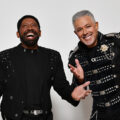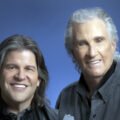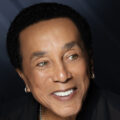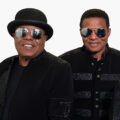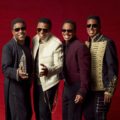Jerry Martini and The Family Stone want to take Genesee “Higher” as they “Dance To The Music”
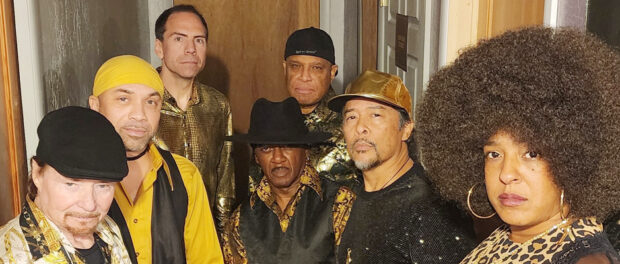
Saxophone superstar Jerry Martini wasn’t just with funk rock/psychedelic soul pioneers Sly And The Family Stone from the very beginning, but was actually the one who proposed the group got started in the first place, a fact further enshrined in Sly Stone’s brand new book, “Thank You (Falettinme Be Mice Elf Agin).”
Though the leader’s more or less retired, the latest line-up of The Family Stone remains on the road thanks to the aforementioned Rock and Roll Hall of Famer, whose distinctive fingerprints can be found all over such boundary-shattering favorites as “Dance To The Music,” “Everyday People,” “Stand!,” “Hot Fun In The Summertime,” “I Want To Take You Higher” and “Family Affair.”
The Genesee Theatre gets a chance to hear that entire history on Friday, May 17, though in the meantime, Chicago Concert Reviews caught up with Martini, 81, for reflections on his role in the recently unearthed “Summer Of Soul” documentary about the historic Harlem Cultural Festival, winning over the masses at the even more humongous Woodstock, plus being the inaugural American pop act to ever feature members of multiple races and genders.
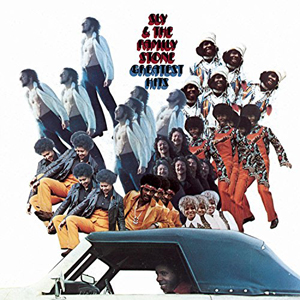 What do you have planned for the Genesee?
What do you have planned for the Genesee?
Jerry Martini: We’re switching a lot of the hit songs. We don’t want to keep doing the same hit songs over and over, so we’re mixing ‘em up a little bit more right now. Our band leader, Blaise Sison, is sending out stuff that he wants everybody to go over. Of course, I remember my part cause I recorded it 50 years ago (laughs). We just have fun, a nice live show. There won’t be any sitting down on this. For maybe one song we might have a slow one, but it’s pretty much gonna be up-tempo Sly And The Family Stone hits.
Can you recall any previous concerts throughout the Chicago area over the years?
Martini: Oh yeah, especially in Chicago. We got blamed for the [1970] Chicago riots when it wasn’t our fault. We drove all night to get there on time in several limos and they announced us. They told us we were supposed to go on at a certain time and we got there in plenty of time, but when we reached Chicago, they were already having riots. We offered to take a helicopter in at our own expense and they said, “no, no, you’re not needed” and then they canceled all the future concerts in Chicago [at the time]. We got the blame for it and it was a sad time, but since then, we’ve played in many places in the Illinois area and the fans are great.
It was just a political thing. That’s just an old story about things that happened to you. When you’re very popular, sometimes you can be used as a scapegoat and that’s what happened to us. The first Mayor Daley, he didn’t want any more concerts there, so we were a good way to get out of that whole thing because they had the riots. We got blamed for the whole thing, which was very sad because we love Chicago…It was at Grant Park if I’m not mistaken…Illinois is a big state. We’ve played all over there. We’re really looking forward to coming [back] there. We’re gonna kick butt (laughs).
In what ways did the group stand out from what else was happening when you started?
Martini: First of all, we were the first biracial American pop group. We had [drummer] Greg Errico and myself, Jerry Martini, two white guys in a predominately African American band…I remember the first time I played at the Apollo Theater, which was around then. When I walked out on stage with my white face and my long hair, long hair back then- I was in my 20s- they started booing me and throwing things. Sly stopped and he said, “You don’t gotta be any color to be in this band. You have to be able to play. Now play Jerry.” So I just started playing some blues, and stuff, and one of the lovely ladies in the audience said, “send that boy out here” and everybody started laughing. From that point on, the Apollo Theater is one of my favorite places to play.
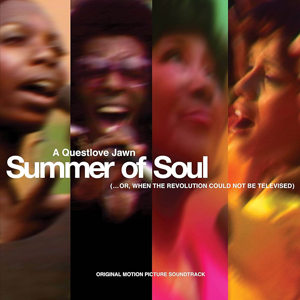 What are your reflections on performing at the Harlem Cultural Festival and it finally getting more widespread attention with the “Summer Of Soul” documentary?
What are your reflections on performing at the Harlem Cultural Festival and it finally getting more widespread attention with the “Summer Of Soul” documentary?
Martini: Oh, it was hot (laughs). It was at a park in Harlem and we looked very weird to them because of the way we dressed, and the ethnic mixture. I remember what I was wearing even. I had a blue velvet long shirt, like a jacket/shirt, and I always stood next to Sly when we weren’t playing. They didn’t understand at all at first. It took us about 20 minutes for them to warm up to us cause we looked weird to them. We didn’t look like your average band that came to play the Harlem Cultural [Festival] (laughs). You know, it was pretty odd. Back then it was Black and white. Everything was Caucasian and African American. But we were different, and about half way through the show, they got into it and that’s probably the main point you’ll see in that documentary.
That documentary was done back then and I’m glad that Questlove brought it out. Questlove’s been around a lot actually. He’s a young man, but he’s very talented. He’s a good drummer. I first met him in Las Vegas when his band [The Roots] played with the band that I have now. He went on to be a musical director [for “The Tonight Show Starring Jimmy Fallon”] and an Oscar winner. He’s an incredible person. He got an Oscar for putting that first “Summer Of Soul” out. He came out here [to California] with Joe Patel and I filmed an interview with him, three hours the first day, four hours the second day…
They’re also doing a film on Sly And The Family Stone and I also have about eight or nine hours in on that. Mark Davis, who’s a pretty famous producer, I’ve been talking to him for a couple months now…Actually, there’s a resurgence of Sly’s songs because they don’t get old when they’re good. It’s like music standards. In the old times, they had Glenn Miller and all those people. Their songs are considered standards cause they’re still being played and Sly Stone’s songs, that’s the same way. People don’t get tired of ‘em. When we play, we play for thousands of people, and the children, and grandchildren, and some of the original people come. When the music is good, it never gets outdated.
Then of course there’s Woodstock. What did you take away from that fateful day?
Martini: It was the biggest one. Half a million people almost. We stayed a few miles away from the actual venue at the Holiday Inn. There’s only a two story Holiday Inn. I remember we had the top floor, and when we got there the day before, I was up to my knees in mud. Back then, they only had one stage. Nowadays, you have a stage behind the stage and you roll one off, roll the other one on, so there it goes. We were supposed to go on at ten o’clock and were waiting backstage in the tent for hours. We went on at three in the morning. Everybody was in their sleeping bags, and when we started jamming, everybody jumped up and it made the hair stand up on your arms. Half a million people jumping up and down in front of you!
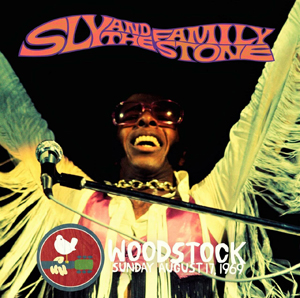 What effects did that movie have on the group’s popularity?
What effects did that movie have on the group’s popularity?
Martini: That and one other thing back then [had a huge effect]. Television was live, and in 1968, the year before, our first hit was “Dance To The Music” and we did that live on “The Ed Sullivan Show.” That just opened up a lot of doors, and then Woodstock. Now you just get clips of it, but there’s like an hour-and-a-half movie on Woodstock that’s available and it changed our lives. We went from just doing casinos and small events, to big fairs and festivals all over the world.
What are your thoughts on the band being sampled so many times over the years?
Martini: Well, I’m waiting to get twenty dollars or something from that damn stuff (laughs). I don’t care. It’s an honor. They’re making money. Most of the rap people are the ones that sample it and I love them all. You know, I look at rap different than a lot of people who go, “Well, that ain’t music.” Maybe it’s not, but you know what it is that people don’t realize? It’s poetry, you know, and it’s hard to define a lot of music coming out. You can’t say it’s “a” or “b.” You can definitely tell the types when music is like, obviously Caucasian, like I play with The Box Tops and all those other bands on the ships, on the Flower Power Cruise. It’s predominately Caucasian bands, but we’re not, (laughs). We’re mixed, still. The version that I have still has a multi nationalities, even more than the original band because we have Black, and white, and Filipino…We do the Soul Train Cruise too [with acts like] The Temptations, which are my favorite because I like funky music. They’re all great. There’s so many fantastic musicians out, and the ones that are not with us anymore, they have replacements that did their homework.
Tell us a bit more about your current line-up.
Martini: The guy I have doing Sly’s part is amazing. I found him [Swang Stewart] about six years ago in New York at B.B. King’s [Blues Club] before they closed it [in New York City] and he’s great. He does what Sly did. He has a great voice. He can play five or six instruments. Plus we have Sly and Cynthia Robinson’s daughter, Phunne Stone. That’s her real [middle] name and Sly gave her that name. Her [first] name is actually Sylvyette. [Original trumpet player/vocalist] Cynthia Robinson is her mom, so we still got a lot of history coming on this, plus I’m technically the founder of the band, according to Sly. I don’t have to, like, go blow my whistle cause Sly’s doing it for me. And he’s doing wonderful right now. He’s not performing anymore, but he’s doing well. People say, “Is he still living in a van?” No, he’s got a beautiful home. He makes a lot of money from his royalties, as do we. We got ‘em back from those who steal and you don’t have to name a name. You can just say what happened, you know?
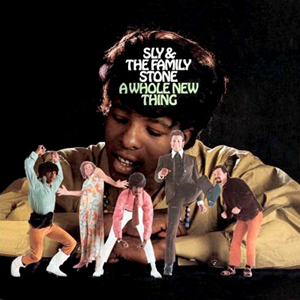 You have so many iconic songs. What are a few personal favorites?
You have so many iconic songs. What are a few personal favorites?
Martini: I like a lot of the ones from our first album, “A Whole New Thing,” which you’re not gonna hear because our first album, it was diverse. It has several different lead singers on it, and had a lot of rhythms and stuff that had never been played. That was our first album and it only went over in Vegas and New York. So our second album, our first major hit was [the title track] “Dance To The Music,” which I love. It’s a simple song, but it reaches out to everybody.
In your opinion, what are some of the group’s most important social commentaries?
Martini: The fact that you don’t have to have one ethnic [group]. In the old days, the bands were all separated. You had your white bands, your Hispanic bands, your Puerto Rican bands, and nowadays [that’s not the case]. We were pioneers on that. We mixed it up. I’m a mutt. I’m Italian, Russian, Irish and Navajo Indian, so I have a lot to claim. Greg Errico is full-blooded Italian. I’ve got a piece of that with a name like Martini. That’s a Northern Italian name, but anyway, the message is, “everybody’s getting together now.” There doesn’t have to be the turmoil that they have going on right now. I don’t want to get into politics, but I’m ashamed of what’s happening with our colleges and everything. That is not American. That is not what we stand for and that’s not what this band stands for. We’re about unity. We’re about multi-racial, multi-ethnic [membership]. We’ve gotta get it back to how things were before right now. There’s too much going on right now that shouldn’t be happening.
How do you feel like the musical part of the world is going at the moment?
Martini: There’s still a lot of really good music out there. I believe that AI has taken over too much. It’s taking the jobs away from thousands of musicians, and it sounds good, but artificial intelligence does not have a soul. You can make funky notes and stuff like that, but you can’t recreate the human soul and that’s about as deep an answer as I can give you on that one. You can’t beat live man, like a lot of people go out, there’s one person out front and the rest is recorded music, and it’s not the same. That’s just my opinion. I’m sure people will argue against that. Music is about human expression, live human expression. It’s not about artificial.
Outside of The Family Stone, you’ve worked with tons of other major artists. Who are some of the ones you’ll never forget?
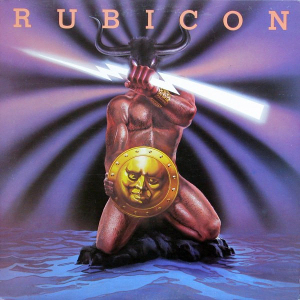 Martini: I just sat in with everybody. I had a band called Rubicon that got up to top twenty on the charts [with the single “I’m Gonna Take Care of Everything”], and then our musical manager, who I won’t name, pulled us off of 20th Century [Fox] and couldn’t get us another record deal. The band broke up and my bass player, Jack Blades, and [guitarist], Brad Gillis, ran off and formed a band called Night Ranger, which has sold millions and we’re all still really close. My lead singers in that band have all passed away, but that was my major contribution personally. Then I moved to Hawaii in 1980. I said, “I’m just going to go chill for awhile.” I stayed there for 20 years and I just played all around. I came back and I went on the road with Larry Graham, [bassist/vocalist and fellow original member of The Family Stone], and Prince for almost four years, from 1996 to 2000. I did 15 countries with Prince.
Martini: I just sat in with everybody. I had a band called Rubicon that got up to top twenty on the charts [with the single “I’m Gonna Take Care of Everything”], and then our musical manager, who I won’t name, pulled us off of 20th Century [Fox] and couldn’t get us another record deal. The band broke up and my bass player, Jack Blades, and [guitarist], Brad Gillis, ran off and formed a band called Night Ranger, which has sold millions and we’re all still really close. My lead singers in that band have all passed away, but that was my major contribution personally. Then I moved to Hawaii in 1980. I said, “I’m just going to go chill for awhile.” I stayed there for 20 years and I just played all around. I came back and I went on the road with Larry Graham, [bassist/vocalist and fellow original member of The Family Stone], and Prince for almost four years, from 1996 to 2000. I did 15 countries with Prince.
What was it like to work so closely with Prince?
Martini: He was actually an incredibly talented and genius young man. He drove a hard bargain. You couldn’t mess around with him. He was really into doing things the right way. He was a perfectionist, and if you didn’t make the grade, you were off the stage. I saw him fire a sound guy in Europe, kicked him out of the building cause he made a big squeak noise twice on this show.
He was brilliant. He knew about all the music. He played every instrument expect horns, thank goodness. He was just a million man. He covered all the bases. It was amazing to work with him. His favorite band growing up was Sly And The family Stone, so that’s why Cynthia and I, my partner, [toured with him]. She passed away about six years ago and I never got another trumpet player. I have two keyboardists, and Jimi McKinney, he and I are the whole horn section, just the two of us. We don’t need that to have another trumpet player up there cause she’s irreplaceable.
Have you had a chance to read Sly’s book yet, and if so, what were your thoughts?
Martini: Oh, of course. I have it siting right next to my bed. He really spoke well of me. I was honored that he gives me credit for starting the whole [band], which I did because we played together when we were younger, and he tried to start a band before us, and the guys were like the typical musicians back then. They would have a cigarette on the string, on the guitars, and they would be late for rehearsal. They were called Sly And The Stoners and it just didn’t go, so he just pulled it, became a great DJ.
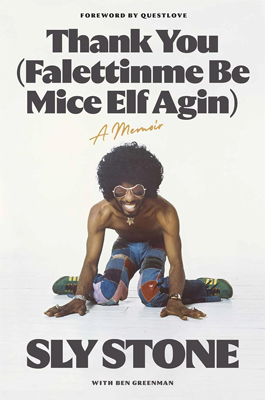 We still hung out a lot. We were very close and I talked him into starting the band that had all the hit records and he wrote about that in the book. He mentioned everything, which is really good because I’m not out looking for recognition. I just want to do what I do, but it’s coming my way right now, 50, 60 years later. People are crediting me, even in the movie, and the new documentary and everything, that I started the band, which is a good thing because I’m keeping the band. I’m keeping the namesake. We’re just called The Family Stone now. We can’t use Sly And The Family Stone of course, but Sly gave me permission to use The Family Stone and I’m gonna do that until I can’t play no more.
We still hung out a lot. We were very close and I talked him into starting the band that had all the hit records and he wrote about that in the book. He mentioned everything, which is really good because I’m not out looking for recognition. I just want to do what I do, but it’s coming my way right now, 50, 60 years later. People are crediting me, even in the movie, and the new documentary and everything, that I started the band, which is a good thing because I’m keeping the band. I’m keeping the namesake. We’re just called The Family Stone now. We can’t use Sly And The Family Stone of course, but Sly gave me permission to use The Family Stone and I’m gonna do that until I can’t play no more.
You probably have a book in you as well, right?
Martini: You say I have it in me, but everybody has all my material (laughs) for their books. I started writing one 25 years ago and they say, “How come it’s not out?” I say, “cause it’s not finished” (laughs). It’s not really stolen cause I’ve just given it away. I gave eight hours of my book to the new documentaries, not Sly’s book. That’s a short book and it’s really well written. He did a good job, but anyway, all the other stuff that’s coming out right now, it has most of my book in there except for all the personal things. I have the one that is just a straight story of stuff and then I have an X-rated one even, which I probably won’t put out about all the little naughty things that you do on the road (laughs), when I was younger of course.
In the meantime, what else does The Family Stone have planned?
Martini: Actually, I talked to Sly about it. Maybe record. See, he has tons of stuff. He has over 300 songs [that] haven’t even been heard yet, but we just talk about us recording some of his stuff with him producing of course. And we’re playing in Jakarta at a big festival there, the Java [Jazz] Festival, in a couple weeks right after we play in Illinois. Then we’re playing in London with Chaka Khan and then we’re negotiating in France right now all in the next few months.
It was global [originally as well], except there was a lot of things that got in the way, like false charges and stuff, and Sly just didn’t want to travel overseas anymore, but a few years ago, I played with Sly in Japan. It was a few of the original members, about four or five of us, and that went over good, and then he says he’s just retired now. He’s already done his part and then some, but he’s still in the picture. Pretty much he’s given me a free hand, but I wouldn’t want to do anything that he would really disapprove of because he made it be a legend and I’m continuing that legend.
The Family Stone performs at the Genesee Theatre on Friday, May 17. For additional details, visit TheFamilyStoneBand.com and GeneseeTheatre.com.

